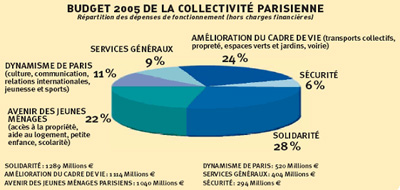|
|
ECONOMY
A dynamic, political, administrative, financial, cultural and
educative capital; 80% of the residents of Paris are employed
in the tertiary sector. The city brings together a concentration
of political institutions, embassies, administrative headquarters,
international organisations (OCDE,
Unesco,
corporate headquarters (especially around the
Champs Elysées, Opera
and Bourse).
), Europe’s second biggest stock exchange after London,
prestigious universités,
and notable tourist centres (Disneyland),
40% of the employment in the greater Paris region is found within
the city walls, with only 23% of the population.
Efforts to decentralise have seen a great many jobs move out
to Defense, the satellite towns or elsewhere in the greater
Paris region (administrative centres, corporate headquarters,
big schools like the Polytechnique or the Centrale…),
or out of the region entirely (ENA). In spite of decentralisation
and an extensive modern public transport network, traffic jams
in the capital due to commuting remain considerable.
One of the characteristics that Paris has retained since the
time of the monarchy is a strong sociological and economic contrast
between the east and the west of the city. This phenomenon arose
in Paris for the same reason it arose on London; the wealthier
inhabitants had no desire to subject themselves to the city’s
cloud of factory smoke, which was carried towards the east by
prevailing winds. In fact the very beginning of the east-west
divide dates back to Henri IV’s choice of the Louvre as
his residence, back in the early 16th century. The royal court
followed the king to that part of the city and had great mansions
constructed in the Saint-Honoré area. The focus moved
to Saint-Germain
near the end of the 17th century, as it was on the road to Versailles.
Overall, there is an overrepresentation of qualified workers
in the city’s population. The percentage of executives,
professionals, artists, students and researchers is greater
than the 3.4% of the workforce that they make up.
Paris remains attractive and competitive for business. In 2003,
businesses in the capital numbered 301,000 (of which 22,658
were new businesses, an increase of 2.11% from 2002). For every
business that closes, 1.41% new businesses are created. The
attraction of Paris is demonstrated that much more by the city’s
status as the point of reference for the organisation of international
events, shows,
conventions…
In order to maintain this image, the Paris Development Agency
works for the economic promotion of the city as well as for
the emergence of new competitive industries, particularly in
the sectors of digital technology, health and design. It acts
to welcome and advise foreign companies that want to establish
a presence in Paris. The agency recently published figures related
to its “public incubators”, which are structures
that host young businesses and offer them non-profit services.
Out of the 168 projects that the agency has dealt with to date,
116 new businesses have been created, which represents a success
rate of 69% and the creation of 799 jobs. After this creation
phase, businesses can develop on their own or benefit from business
“nurseries”, such as (Paris Biopark, Paris Cyber
Village).
The agency also organises events: their Matinales have become
an important monthly meeting for business creators to find and
exchange information; then there is the grand prize for innovation,
which is awarded each year to a project judged to have great
potential. Last year, the prize went to a company called Léosphère,
for their production of technology for measuring air quality.
The two brothers at the origins of the company have now installed
their business in the Paris Innovation nursery. They signed
their first contract in October 2004. During a business trip
to China to promote their new technology, the brothers observed
that the positive international image of Paris helped the credibility
of their project. Other organisations, such as the business
incubator, Boutique de Gestion (Management Shop) or indeed the
Maisons du Développement Economique et de l’Emploi
(Houses of Economic and Employment Development), exist to help
people interested in starting a new business in any sector.
Information on Paris and its development.
Information on starting a business, the Maisons du Développement Economique et de l’Emploi and Boutiques de Gestion can be found on the ECONOMIE DE PARIS website.
The Parisian budget for 2005 is essentially based on three areas: social emergencies, access to lodgings and employment, and the fight against inequality. It is a budget that has given an important place to investment, increasing by 34% from 2004.

Source:www.paris.fr
- Paris-city Partners :
- Music News
- Rock, Jazz & Blues CDs
- Learn French in Paris
- Learn French in France
- Paris Junior Programs
- Learn English in England
- Business English Courses
- Need a translation?
- For teachers of French
- French Exercise & Tests
- Directories
- English courses for Teens in UK
- Camps for Teens in England
- Language Courses Abroad
- English courses in England
- Learn a Language Abroad


